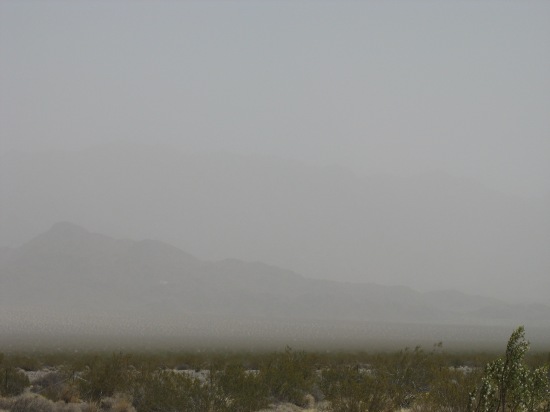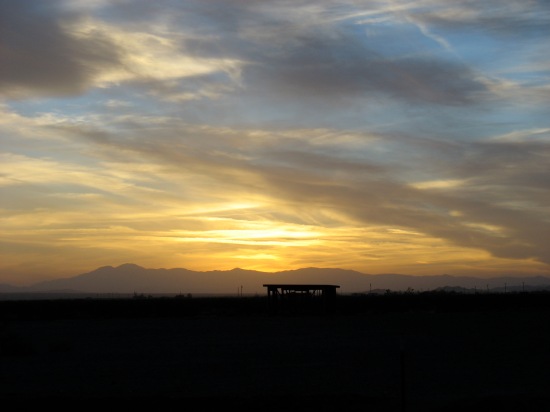Sand-strewn winds howl across this lonesome valley, locking down our usual views of rugged mountains rimming every horizon near and far with flying debris and dust-clogged air that pummels and then whips your hide when you chance it, so we mostly don’t. We’ve had weeks, even months of this weather now, and it feels apocalyptic, testing our commitment to a minimalist homestead in a desert that’s outlasted many a previous like-minded soul. I find the raging winds a comfort—data for my hope that we’ll never be overrun and turned into a city—but that is because I can retreat behind sturdy walls where hearing is my primary sense for engagement except for memories of stiller nights.
Sunset found us huddled indoors watching Carl Sagan’s Cosmos, halfway through, a first for me. When the series originally aired, I didn’t have a TV or any habit of it. TV was a sin in the church of my childhood and, while I disagreed with them about nearly everything else, by the time I was an adult and checked it out for myself, I thought it would rot my brain and didn’t imbibe except on rare occasions. Even when it came into the house of my first marriage (the next year), I couldn’t connect with the technology: bored, I would fall asleep if I didn’t create mental tasks to focus on instead (thus relying on the same technique I’d used to survive evangelical sermons and prayer meetings). Eventually my children and I had a TV I sometimes watched and a VCR and at some point I had some understanding that Cosmos existed, but I never got around to watching it.
In the manner that cultural illiteracy comes so easily to most of us, the required-for-Gen-Ed-credits astronomy course I took in college was taught by a knucklehead who marched around my lab table so many times carrying an orange and intoning “The Earth moves around the Sun, repeat after me: the Earth moves around the Sun” that I spent a considerable part of every hour in that room wondering if I should just go on and take him out with a sharpened pencil and risk the consequences. I got an A because I remembered whatever I saw and reprised it on exams with ease, but I hated the subject with a fiery passion and decided that, if I managed to make it out of that course without winding up in prison on account of a pencil, I would just look at the sky and enjoy the mystery. A curiosity about physics and Enlightenment science lured me permanently into that realm about then, but I’ve stuck with the old thinkers, the long dead for the long past, and with indigenous teachers for the now. Sagan wasn’t either one, so he stayed off my map. I work for a living and am stingy with how I spend my limited time. (Which is another way by which smart people are readily made illiterate.)
Somebody I trust, however, finally convinced me that we should watch this series, and oh, how grateful I am already for that! How farseeing Sagan was, how prescient, how like so many before and since who have taken the contemplation of the stars and planets seriously! How much wiser might we all be if we ensured that everyone who wanted to do something similar could participate knowledgeably in these conversations! As I listen to Sagan’s sonorous voice now (concurrently enrolled in four MOOCs on the physics and mathematics of the solar system), it comes strong to me that, if we ever wish to solve the greatest problems of our times, we must reckon better with the fact that we’re fighting the wrong battles on planet earth some days. Social inequalities, environmental destruction, dimwitted political leadership, and exploitative corporate plunderings are intimately connected to a people’s lack of vision, disconnection from mystery and learning alike, and inability to wonder while we work ourselves to death. Vision. Mystery. Learning. Wonder. Work that does not pervade breathing 24/7/365. We need ’em back. Now. They’re just about all we have to stand between us and our looming abysses of illiteracy.
Of course I adore and am daily grateful for Neil DeGrasse Tyson and his Cosmos—a few minutes of which I have seen but then turned off until I could watch Sagan’s first. I am grateful for Tyson’s efforts to rekindle curiosity about science and astronomy and physics while batting down ignorant, pseudo-religious, anti-science pontifications on a regular basis. I am daily grateful for so many indigenous leaders who have steadily stewarded their peoples’ understandings for the young coming on and who have welcomed people like me with our questions; daily grateful for any spiritual folk of any ilk who ask questions not designed to ensure the killing of those who ask them not or otherwise: daily grateful for the hundreds of millions of regular folks who get no air time or honor or credit but still get up every day and work ceaselessly to make a small life in conditions of abject poverty created on purpose by elites and organizations with more money than good sense or compassion. But if we are ever to have more viable visions worthy of our home in this universe on this particular planet, we need more ways to connect ourselves steadily to the cosmos. And, toward that end, I am also deeply and daily grateful for the likes of MIT and Yale and Brown and Wesleyan and the veritable slew of other institutions who are making such knowledge more available to more of us for free.
But Carl Sagan’s Personal Voyage is a fine and far more accessible introduction, and I find myself wishing that small children could see it until it becomes a background track of their over-burdened, over-scheduled, over-tested lives. I’m pretty sure that, if someone had stopped me in my tracks 20 years ago and had me watch the whole thing end to end, I would have done several things differently, starting somewhere in the middle of the first episode and not likely ending yet.
We face so many existential threats as human beings anymore. The answers for them are all about us, littering the fields of our endeavours just as this sandstorm seeds this desert tonight: nearly everything is moving too fast for us to get a good grip on it and, whenever you do manage to take a wavering step outside, you do it knowing somebody’s fixin’ to take a full-throated swing at your hide. We could do worse than be reminded that in all times and places known to our species thus far, this has been true for seekers of knowledge. Intolerance, ignorance, and pure de ol’ meanness stride across every generation seeking to slap down those who question, those who wonder, those who want to drill down beneath the pablum of propaganda and conjured deaths posing as all there is or can be. Meantime there are all these grand and lively traditions of inquiry, all under daily threat now, yes, but still fertile, still questing: mathematics and physics and astrophysics and histories and anthropologies and stories and teachings and songs and so, so many more.
I am re-hitching my soul’s wagon to the cosmos, to inquiry, to the search for knowledge that inspires living visions and humility and just enough grit to hang on until. The wind will lie down once again for a spell, the sun and the moon will ease back into view, the stars will grace these night skies and fall just rarely enough that we’ll sit by our tiny fire and light up the valley with our astonished whispers. The planet will go on. Until is a long, long time away, so very near to here.
~
All images and content in this post, as with all on this site are original, subject to copyright, all rights reserved. If you wish to share or post them, please do so with a link to the page on which you found them. Thanks in advance for your consideration. © Hannah Nyala West and pointlastseen.wordpress.com, 2009 — present. (Formal copyright notice on About page.)



